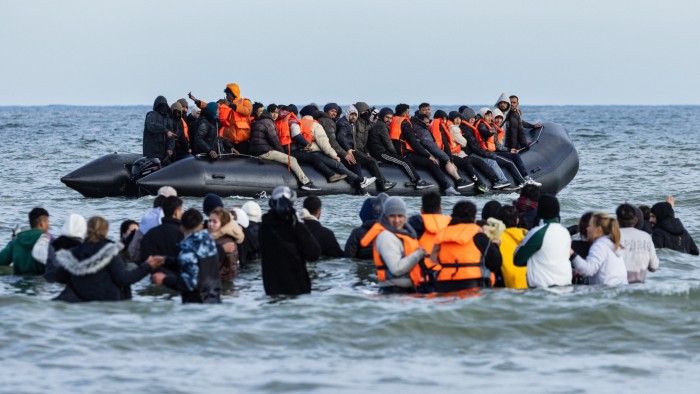Unlock the Editor’s Digest for free
Roula Khalaf, Editor of the FT, selects her favourite stories in this weekly newsletter.
Cutting the number of small boat crossings by half over the next three years would count as a success, according to Sir Keir Starmer’s border security tsar, who said there would always be people searching for ways to migrate to Britain.
“I’m realistic that there will always be people who seek to move [to the UK],” Martin Hewitt, the UK’s Border Security Commander, told the FT on Monday at the start of a two-day summit to tackle Organised Immigration Crime.
“I think what [success] looks like is a very, very significant reduction in the level of crossings,” he said, adding that he would be pleased “if we can get to literally halving [crossings] and consistently” by the end of his tenure. Hewitt has committed to serve as Border Security Commander for at least three years.
“There are conflict regions around the world which are going to make people want to move. You’ve got climate change issues as well that will make people want to move,” he said, adding that there is “no quick answer to solving this issue”.
The UK prime minister is determined to slash irregular migration to Britain as he believes it is the only route to combating the rise of far right populism in Britain. Polls suggest that immigration and asylum is ranked as the second most pressing issue by the British public after the economy, having overtaken health last year.
Speaking as he opened the two-day summit at Lancaster House, Starmer said that “for too long, the UK has had a soft touch” on irregular migration, and vowed to “get to grips with it once and for all”.
“There is little that strikes working people as more unfair than watching illegal migration drive down their wages, their terms and their conditions,” he added.
The summit brought together political leaders, ministers and law enforcement bodies from more than 40 countries, including Vietnam, Iraq and China.
Hewitt, a former chair of the National Police Chiefs’ Council who was appointed Border Security Commander in September, pushed back against claims that successive governments’ attempts to thwart criminal gangs was akin to the war on drugs, which has done little to curb the cross-border production, sale and consumption of narcotics since the 1970s.
“The drug trade has significantly larger amounts of money involved, significantly larger numbers of organised criminals involved,” he said. “I think [small boats] is beatable in a way that I wouldn’t make the same argument with the drugs trade.”
Hewitt pointed to the effectiveness of efforts to curb previous dangerous people-smuggling routes into Britain, including in vans and on trains, as evidence that police interventions do work — even if they transpose the problem elsewhere.
Recent Home Office data showed that some 40 per cent of all asylum claims in 2024 were made by people who had arrived in the UK legally on a visa, compared with 32 per cent that were made by small boat migrants. The data suggested the number of people transitioning from visas to asylum claims had risen year on year.

Hewitt said one of his principal aims was to drive up the price of small boat crossings until were no longer viable for would-be asylum seekers.
Hewitt said that since last summer there had been a three-fold increase in the cost of equipment such as engines and life jackets for the smuggling gangs.
“That cost [of equipment] is now being borne by criminals but there will have to come a point where they’re going to have to start passing some of that on to the people that are trying to travel,” he said.
Starmer also confirmed on Monday that the UK government was looking at European proposals to set up “returns hubs” in third-party countries where migrants would be sent if their applications had been rejected. Italian Prime Minister Giorgia Meloni namechecked the European proposal in a video address at the start of the summit.
“We are working with other countries on anything that we think will work,” Starmer said.




